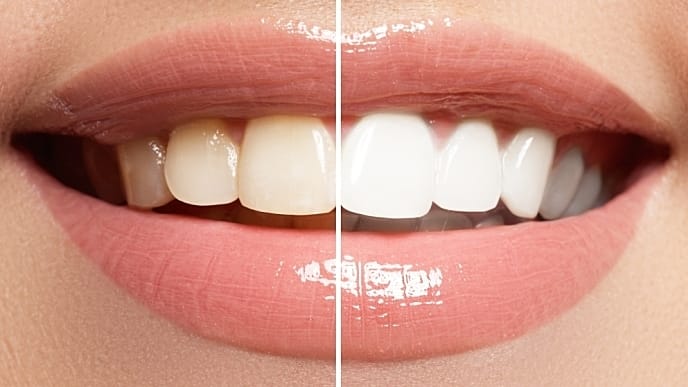When it comes to enhancing the appearance of your smile, teeth whitening, and dental veneers are popular solutions. However, many people wonder: can teeth whitening work on veneers? To fully understand this, it’s important to delve into how veneers work, the nature of Teeth Whitening Dubai, and the limitations and considerations associated with these treatments.
What Are Veneers?
Veneers are thin, custom-made shells designed to cover the front surface of teeth. Typically made from porcelain or composite resin, veneers are used to improve the appearance of teeth by correcting discoloration, chips, cracks, and even minor alignment issues. Porcelain veneers, in particular, are known for their durability and ability to mimic the natural shine of enamel.
The Science Behind Teeth Whitening:
Teeth whitening treatments use chemical agents, typically hydrogen peroxide or carbamide peroxide, to break down stains on the enamel. This process lightens the natural color of the teeth by removing surface stains and penetrating the enamel to address deeper discoloration. However, it’s crucial to note that teeth whitening works exclusively on natural enamel.
Can Teeth Whitening Work on Veneers?
The short answer is no; teeth whitening products will not change the color of dental veneers. The primary reason for this is that veneers, particularly those made of porcelain, are non-porous and do not absorb the whitening agents in the same way natural enamel does. This means that while natural teeth may become whiter with a whitening treatment, the veneers will remain the same color.
Why Can’t Whitening Products Affect Veneers?
- Material Composition: Porcelain and composite resin are materials that do not allow whitening agents to penetrate their surfaces. Unlike enamel, which is porous, these materials are designed to be stain-resistant and durable but impervious to whitening agents.
- Color Consistency: Veneers are custom-colored to match the surrounding natural teeth. If you whiten your natural teeth after getting veneers, the contrast between the two can create an uneven look. This is because the whitened teeth will appear brighter, while the veneers will remain unchanged, making the veneers appear darker in comparison.
- Risk of Damage: Whitening products can be abrasive and may damage the bond between the veneers and the underlying tooth structure. This can potentially compromise the durability and longevity of the veneers.
How to Address Tooth Discoloration After Veneers:
While whitening agents won’t work on veneers, there are alternative solutions for enhancing the appearance of veneers that may become stained or discolored over time.
- Professional Cleaning: Dentists can perform professional cleaning procedures to remove surface stains from veneers, helping them look brighter and more vibrant.
- Polishing: Specialized polishing techniques can be used to enhance the shine of your veneers and remove minor discolorations.
- Replacement or Touch-Up: If your veneers have become discolored or damaged, your dentist may recommend replacing them with new ones that better match your desired shade.
- Routine Maintenance: Practicing good oral hygiene, such as brushing and flossing regularly, can prevent stains from building up on your veneers. It’s also wise to avoid foods and drinks that are known to cause staining, such as coffee, tea, red wine, and berries.
Can You Whiten Veneers with Special Products?
Some products on the market claim to be safe for use on dental veneers, but their effectiveness is often limited. These products might include whitening toothpaste that contains mild abrasives to remove surface stains, but they won’t change the color of the veneers.
If you’re considering using such products, consult your dentist to ensure they won’t damage your veneers or wear down the material over time. Dentists may recommend specific products or techniques that are safe for veneers, which can help maintain their appearance without risking damage.
Considerations Before Choosing Veneers:
If you’re considering veneers and want to maintain flexibility in whitening your smile in the future, it’s essential to choose a color that matches your natural teeth, factoring in potential changes in the shade over time. Consult with your dentist to discuss the long-term impact of choosing a shade for your veneers that aligns with your whitening goals.
Alternatives for a Brighter Smile:
If your primary concern is to achieve a brighter, whiter smile but you already have veneers, you can consider the following options:
- Teeth Whitening for Natural Teeth Only: If your natural teeth are not covered by veneers, you can use whitening products to brighten them, while keeping your veneers as is. This will help you achieve a more uniform smile without altering your veneers.
- Full-Mouth Makeover: For those who want a complete transformation, a full-mouth approach, including whitening natural teeth and possibly replacing old or stained veneers, might be the best option.
- Zoom! Whitening: This professional whitening treatment can effectively lighten natural teeth, but it will not affect veneers. It’s important to discuss with your dentist if a treatment like this is appropriate given your veneers.
Conclusion:
In conclusion, Teeth Whitening does not work on veneers due to the materials’ non-porous nature. While whitening agents can brighten natural enamel, they cannot alter the color of veneers, which can lead to a mismatch in appearance if whitening is done after the veneers are placed. Regular maintenance, professional cleaning, and potential replacement are the most effective ways to keep veneers looking their best. For those considering veneers, discuss long-term expectations with your dentist to make sure your dental work aligns with your aesthetic goals.





Comments